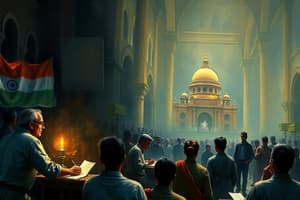Podcast
Questions and Answers
Who is responsible for administering elections at the central, state, and local levels in India?
Who is responsible for administering elections at the central, state, and local levels in India?
- Prime Minister of India
- Election Commission of India (ECI) (correct)
- Ministry of Law and Justice
- President of India
How is the Chief Election Commissioner (CEC) appointed in India?
How is the Chief Election Commissioner (CEC) appointed in India?
- By the President of India
- By the Ministry of Law and Justice
- By the Leader of the Opposition in the Lok Sabha
- By the Prime Minister, Speaker of the Lok Sabha, and Leader of the Opposition in the Lok Sabha (correct)
What is the term of office for Election Commissioners in India?
What is the term of office for Election Commissioners in India?
- 6 years (correct)
- 10 years
- 5 years
- 8 years
Which body funds the Election Commission of India (ECI)?
Which body funds the Election Commission of India (ECI)?
What is the main responsibility of the Election Commission of India (ECI)?
What is the main responsibility of the Election Commission of India (ECI)?
At what age does the Chief Election Commissioner (CEC) hold office until in India?
At what age does the Chief Election Commissioner (CEC) hold office until in India?
What is the first step in the electoral process in India?
What is the first step in the electoral process in India?
What is the age requirement for an Indian citizen to be eligible to vote in general elections?
What is the age requirement for an Indian citizen to be eligible to vote in general elections?
What guarantees the right to vote in India?
What guarantees the right to vote in India?
What is used to improve the transparency and efficiency of the electoral process in India?
What is used to improve the transparency and efficiency of the electoral process in India?
What is the final step in the electoral process in India?
What is the final step in the electoral process in India?
Who prepares the electoral rolls in India?
Who prepares the electoral rolls in India?
What ensures that only eligible voters are able to cast their votes in India?
What ensures that only eligible voters are able to cast their votes in India?
What is required for a person to be eligible to vote in an Indian election?
What is required for a person to be eligible to vote in an Indian election?
Which act governs the electoral process in India?
Which act governs the electoral process in India?
What follows after the submission of nomination papers by candidates in the Indian electoral process?
What follows after the submission of nomination papers by candidates in the Indian electoral process?
What is the main responsibility of the Election Commission of India (ECI)?
What is the main responsibility of the Election Commission of India (ECI)?
What is the role of the Chief Election Commissioner of India?
What is the role of the Chief Election Commissioner of India?
Which act governs the electoral process in India?
Which act governs the electoral process in India?
What ensures the conduct of free and fair elections in India?
What ensures the conduct of free and fair elections in India?
What is the electoral process in India primarily conducted through?
What is the electoral process in India primarily conducted through?
Who is responsible for administering elections at the central, state, and local levels in India?
Who is responsible for administering elections at the central, state, and local levels in India?
What is the penalty for not voting in certain areas of India?
What is the penalty for not voting in certain areas of India?
Who has the authority to re-register a voter if they miss the registration deadline?
Who has the authority to re-register a voter if they miss the registration deadline?
What percentage of the electorate voted in the 2019 general election in India?
What percentage of the electorate voted in the 2019 general election in India?
Which legislation governs the electoral process in India?
Which legislation governs the electoral process in India?
Study Notes
Elections in India
India is the world's largest democracy, with over 800 million people eligible to vote in general elections. The Election Commission of India (ECI) is responsible for administering elections at the central, state, and local levels. The electoral process in India is designed to ensure free and fair elections, and it includes the following key components:
Election Commission of India (ECI)
Established in 1950, the ECI is an autonomous constitutional authority responsible for overseeing the election process in India. The ECI is composed of a Chief Election Commissioner (CEC) and two Election Commissioners. The CEC is appointed by a committee consisting of the Prime Minister, the Speaker of the Lok Sabha (House of the People), and the Leader of the Opposition in the Lok Sabha. The Chief Election Commissioner holds office until the age of 65, while Election Commissioners hold office for a term of six years or until they reach the age of 65, whichever is earlier.
The ECI has the power to regulate the conduct of elections to the Parliament of India and the state legislative assemblies. It also has the authority to supervise elections to the offices of the President and Vice-President of India, and to the offices of the Governors of states. The ECI is funded by the Ministry of Law and Justice.
Electoral Process
The electoral process in India is governed by the Representation of the People Act, 1950, and the Representation of the People Act, 1951. The election process in India involves the following steps:
-
Preparation of electoral rolls: The electoral rolls are prepared by the ECI, and they contain the names of all eligible voters in each constituency.
-
Nomination of candidates: The process of nominating candidates for election begins with the submission of nomination papers by the candidates.
-
Scrutiny of nomination papers: The nomination papers are scrutinized by the ECI to ensure that the candidates meet the eligibility criteria.
-
Withdrawal of candidates: Candidates can withdraw their nomination papers within a specified time frame.
-
Campaigning: The candidates can campaign for their election during a specified period.
-
Voting: The voters cast their votes on the day of the election.
-
Counting of votes: The votes are counted after the polling is completed, and the candidate with the majority of the votes is declared the winner.
Voting Rights
In India, the right to vote is enshrined in the Constitution of India, which guarantees universal adult franchise. All citizens of India who are 18 years of age or above are eligible to vote in general elections. To vote in an election, a person must be a citizen of India, a resident of the constituency, and not be disqualified by law.
The ECI has taken various measures to increase voter participation and ensure free and fair elections in India. For example, the ECI has introduced the use of Electronic Voting Machines (EVMs) to improve the transparency and efficiency of the electoral process. The ECI has also taken steps to address the issue of bogus voting and to ensure that only eligible voters are able to cast their votes.
In conclusion, the Election Commission of India plays a crucial role in administering elections in India. The electoral process in India is designed to ensure free and fair elections, and it includes steps such as preparation of electoral rolls, nomination of candidates, scrutiny of nomination papers, withdrawal of candidates, campaigning, voting, and counting of votes. The right to vote is a fundamental right in India, and all citizens who are 18 years of age or above are eligible to vote in general elections.
Studying That Suits You
Use AI to generate personalized quizzes and flashcards to suit your learning preferences.
Description
Explore the comprehensive overview of elections in India, covering the role and functions of the Election Commission of India (ECI), the electoral process, voting rights, and measures taken to ensure free and fair elections. Learn about the preparation of electoral rolls, nomination of candidates, campaigning, voting, and counting of votes.




